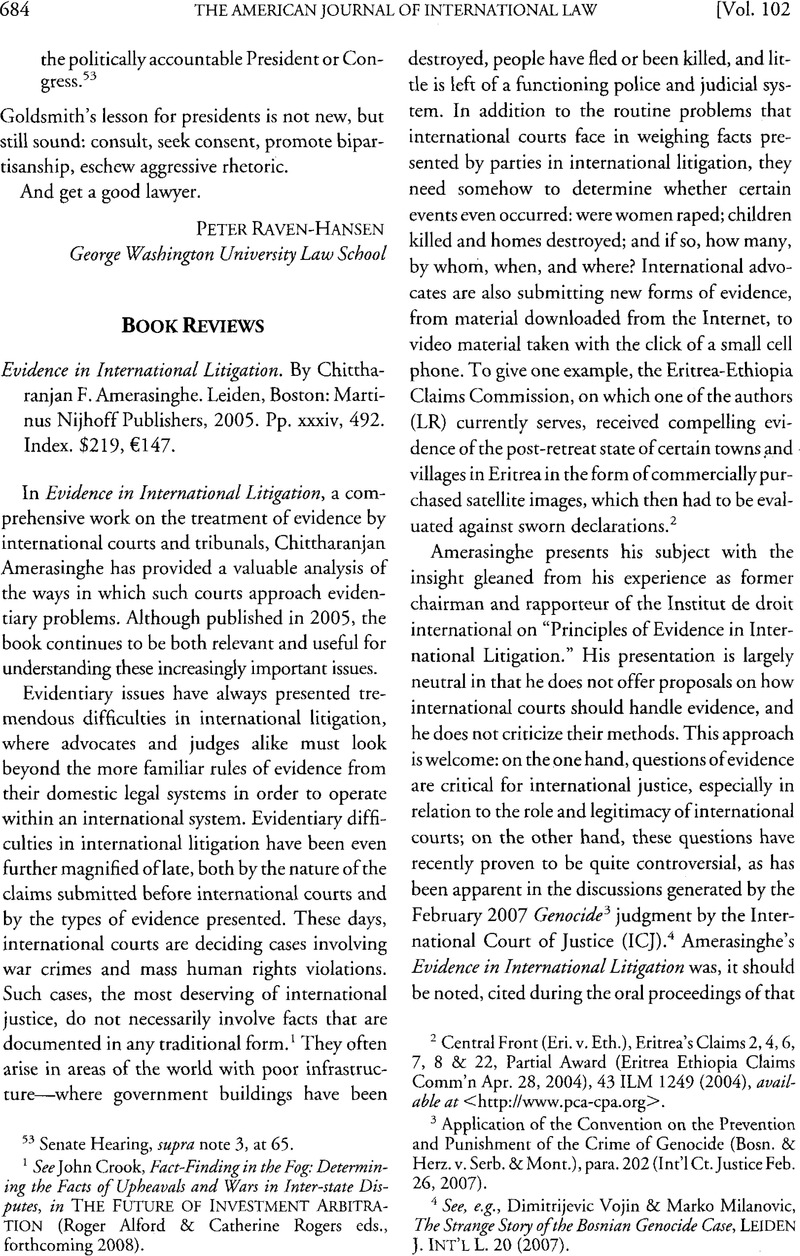No CrossRef data available.
Published online by Cambridge University Press: 27 February 2017

1 See John, Crook, Fact-Finding in the Fog: Determining the Facts of Upheavals and Wars in Inter-state Disputes , in The Future of Investment Arbitration (Roger, Alford & Catherine, Rogers eds., forthcoming 2008).Google Scholar
2 Central Front (Eri. v. Eth.), Eritrea’s Claims 2, 4, 6, 7, 8 & 22, Partial Award (Eritrea Ethiopia Claims Comm’n Apr. 28, 2004), 43 ILM 1249 (2004), available at <http://www.pca-cpa.org>.
3 Application of the Convention on the Prevention and Punishment of the Crime of Genocide (Bosn. & Herz. v. Serb. & Mont.), para. 202 (Int’l Ct. Justice Feb. 26, 2007).
4 See, e.g., Dimitrijevic, Vojin & Marko, Milanovic, The Strange Story of the Bosnian Genocide Case , Leiden J. Int’l L. 20 (2007).Google Scholar
5 The book’s definition of judicial notice was cited during the oral proceedings of the Genocide case by Thomas Franck in February 2006, ICJ Doc. CR 2006/3, at 24.
6 e.g., Keith, Highet, Evidence, the Court, and the Nicaragua Case , 81 AJIL 6 (1987)Google Scholar; see also Stephen, M. Schwebel, Three Cases of Fact-Finding by the International Court of Justice , in Fact-Finding Before International Tribunals 2 (Richard, B. Lillich ed., 1992)Google Scholar; Thomas, M. Franck, Fact-Finding in the I.C.J ., in Fact-Finding Before International Tribunals Google Scholar, supra.
7 In contrast, the ICTY, the International Criminal Tribunal for Rwanda, and the International Criminal Court have elaborate rules of evidence. Also, the UN Truth and Reconciliation Commission’s mandate included different categories of standards of proof, namely, overwhelming evidence, substantial evidence, and sufficient evidence.
8 See, e.g., the separate opinion of Judge Higgins in Oil Platforms (Iran v. U.S.), 2003 ICJ Rep. 161, 189(Nov. 6).
9 Military and Paramilitary Activities in and Against Nicaragua (Nicar. v. U.S.), para. 57, 1986 ICJ Rep. 14 (June 27).
10 Application of the Convention on the Prevention and Punishment of the Crime of Genocide, para. 202.
11 See Hurst, Hannum, Fact-Finding by Nongovernmental Human Rights Organizations , in Fact-Finding Before International Tribunals, supra note 6, at 294.Google Scholar
12 Thomas, Buergenthal, The United Nations Truth Commission for El Salvador , 27 Vand. J. Transnat’l L. 497, 512 (1994).Google Scholar
13 Case No. ICTR-98-44-AR73(C), Decision on Prosecutor’s Interlocutory Appeal of Decision on Judicial Notice, para. 35 (June 16, 2006).
14 See, e.g., Ruth, Wedgwood, Slobodan Milosevic’s Last Waltz , N.Y. Times, Mar. 12, 2007.Google Scholar
15 Thomas, M. Franck, Fairness in International Law and Institutions 335 (1995)Google Scholar.